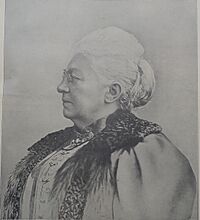Virginie Loveling facts for kids
Quick facts for kids
Virginie Loveling
|
|
|---|---|
 |
|
| Born |
Virginie Marie Loveling
17 May 1836 |
| Died | 1 December 1923 (aged 87) Ghent, Belgium
|
| Nationality | Belgian |
| Other names | W. E. C. Walter |
| Occupation | children's writer, essayist, novelist, poet |
Virginie Loveling (born May 17, 1836 – died December 1, 1923) was a famous author from Flanders, a region in Belgium. She wrote many different types of stories, including poems, novels, essays, and even books for children. Sometimes, she used a pen name, which is a fake name, called W. E. C. Walter. Early in her career, her writing was more emotional. But later, she started writing about difficult topics in a very direct way.
Contents
About Virginie Loveling
Early Life and Family
Virginie Loveling was born on May 17, 1836, in a town called Nevele in East Flanders, Belgium. She had an older sister named Rosalie Loveling, who was also a writer. Virginie and Rosalie often wrote together, especially their earlier, more emotional works.
After their father, Herman Loveling, passed away, the family moved to Ghent. In Ghent, the sisters spent time with a group of French-speaking thinkers. These people often had ideas that were against the church's power. Later, the family moved back to Nevele.

Her Writing Style
Virginie and her sister Rosalie wrote poems that described real life and nature. These poems also had a touch of romance. They also published two collections of essays. These essays were about life in small villages and also about the city life of wealthy people.
After her sister Rosalie died in 1875, Virginie continued writing on her own. She wrote many children's stories. She also wrote novels and essays that showed a clear and often sad picture of her time. Her stories were known for being smart and looking deeply into people's minds. She often wrote about women characters who were strong and complex. Virginie was known for being very honest and direct when she wrote about tough subjects. She didn't use many hidden meanings or metaphors.
Virginie also worked with her nephew, Cyriel Buysse, on a book called Levensleer (1912). This book was a funny look at the French-speaking wealthy people in Ghent.
Awards and Recognition
Virginie Loveling's work became officially recognized when her novel Een dure eed (A Costly Oath) won a special award in 1891. This award was called the quinquennial prize for Dutch literature, given every five years.
Virginie Loveling passed away on December 1, 1923, in Nevele.
Awards and Honours
Virginie Loveling received several important awards for her contributions to literature:
- 1900: She was made a Knight in the Order of Leopold. This is a very high honour in Belgium.
- 1920: She was made a Commander in the Order of the Crown. This is another important Belgian award.
See also
- Flemish literature
- Virginie Lovelinggebouw
 | Bayard Rustin |
 | Jeannette Carter |
 | Jeremiah A. Brown |

